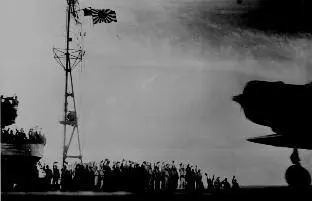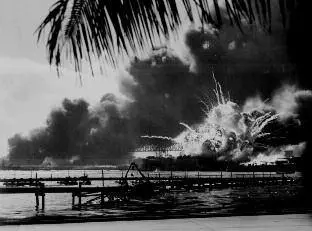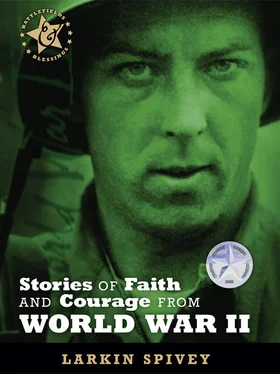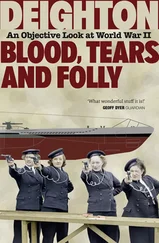“But Lord,” Gideon asked, “how can I save Israel? My clan is the weakest in Manasseh, and I am the least in my family.” The Lord answered, “I will be with you, and you will strike down all the Midianites together.”
—Judges 6:15–16
The main story of Pearl Harbor was the woeful lack of readiness on the part of political and military leaders who should have known better. Any degree of alertness, coupled with minimal dispersal of ships and aircraft could have saved countless lives and invaluable equipment. Pearl Harbor, the movie, was released in 2001. In a thoughtful review of the movie Ken James compared the state of military forces then to our spiritual condition now:
Being reminded of the true story behind Pearl Harbor I can’t help but think about the spiritual parallels. While the majority of people live their lives in relative peace, thinking everything is just fine, how many of us will be blindsided when death comes? And yes, I’m talking to churchgoers too. What have you done to ensure you are ready when the end comes? There’s a statistic that says death is 100% fatal. Sooner or later it’ll happen. I hope you have put your trust in Jesus Christ. He’s the only way to a bright eternity. Trusting in your own good works will get you nowhere. The USS Arizona and other members of the fleet at Pearl Harbor weren’t ready, and they sadly found that out too late. 51
As we live our daily lives, often marked by ordinary routines, it may be difficult to grasp the inevitability of death and the importance of being ready for it. Even so, we must realize that when our time comes, we may not have the luxury of even a moment to prepare ourselves. Even without a clear and present danger to focus our attention, we need to make sure our souls are prepared for the eternal future. (JG)
Therefore keep watch, because you do not know the day or the hour… Then the King will say to those on his right, “Come, you who are blessed by my Father; take your inheritance, the kingdom prepared for you since the creation of the world.”
—Matthew 25:13, 34

Japanese aircraft launch for attack on Pearl Harbor. (National Archives)

USS Shaw explodes during Pearl Harbor attack. (National Archives)
February 5
Attacking the Hinges
On a ship, the worst disaster imaginable is capsizing. Plunged into darkness and turned upside down, the crew has no way to escape. The hull sits on top of them, a barrier to the outside world. At Pearl Harbor, this happened quickly to the Oklahoma, and the West Virginia was in danger of the same fate. Ripped by repeated torpedo hits on the port side, her compartments were flooding rapidly, and the ship was at a twenty-eight-degree list. Capsizing seemed inevitable.
Below deck, there was a group of sailors called Shipfitters who knew what needed to be done. The ship had to be counter-flooded so she could rest squarely on the mud beneath. This required opening a series of valves to let in seawater. The Shipfitters, however, were stymied because the special valve handles they needed were locked in a chest. They gathered around the chest, frantically beating at the lock with whatever was at hand, but it wouldn’t budge. In the midst of the panic and confusion, one of the sailors, Sylvester Puccio, barked for everyone to step aside. He came forward with his tools and started attacking the hinges on the locker. He soon had the doors removed. Within minutes, the little group was opening valves, and the West Virginia started settling on an even keel.
There were many heroes at Pearl Harbor who were recognized for their service. However, it was not until many years later that the son of another survivor pieced together the details of this unheralded incident. He learned that he owed his life and his children’s lives to this man who had saved his father, thousands of others, and a battleship. He was forever thankful that Sylvester Puccio stepped forward on that day, able to think for himself, and able to calmly solve a problem in the midst of chaos. He called him, “An Angel Sent by History.” 52
We may not often have the opportunity to prove our own heroism in a dramatic way, but if we are willing and available, we can be as angels to those around us by recognizing a need and rising to the occasion to meet it.
In all their distress he too was distressed, and the angel of his presence saved them.
—Isaiah 63:9
Henry Lachenmayer was a twenty-two-year-old crewmember of the USS Pennsylvania at Pearl Harbor. During the attack he did his best to perform his battle duties as a medic. He was eyewitness to the destruction wrought on the Pennsylvania and surrounding ships. After recounting the events of the day in his diary, he summarized the rumors that were swirling in the aftershock of the attack:
Here are some of the rumors passing amongst us, none of us having real solid information. Some of the enemy planes were piloted by German fliers. The enemy tried to land troops at Nanakuh and Waikiki beaches, but were repulsed. We sank two enemy aircraft carriers some distance from the islands. Wake and Midway islands are in Japanese hands. Saboteurs land in great numbers on the island. We had two more alarms… but these proved to be only scares. 53
We always hear rumors, especially in times of uncertainty. When the facts are unknown, there always seems to be someone willing to supply them out of his own imagination. Jesus was aware of this all-too human tendency and tried to prepare his disciples to deal with it. When they asked him to explain what would happen at the time of his return, Jesus warned them, “You will hear of wars and rumors of wars, but see to it that you are not alarmed” (Matthew 24:6). He then told them to ignore the rumors. He told them, in fact, that they could ignore all human sources of news. They would directly and personally know when the Son of Man returned to Earth.
For as lightning that comes from the east is visible even in the west, so will be the coming of the Son of Man… They will see the Son of Man coming on the clouds of the sky, with power and great glory.
—Matthew 24:27, 30
After Pearl Harbor had been attacked, news spread like wildfire throughout the nation. As you would expect, every question could not be answered immediately. Where will the Japanese strike next? Is the rest of the nation safe? Rumors began to circulate to “answer” these questions. People heard that bombs were hitting American cities, that American ships were being sunk at sea, that the Panama Canal was blocked. Word spread that Japanese forces had established beachheads at San Francisco and Long Beach. Widespread anxiety was reported:
It was a rough Sunday night on the West Coast, where a follow-up Japanese attack seemed more likely than anywhere else. Around San Francisco Bay, fire sirens sounded falsely three times to warn residents of possible air attacks. Unpracticed civilian defense volunteers darted around neighborhoods yelling “Lights Out!” Police ordered drivers to turn out their headlamps and proceed using only their parking lights. Japanese planes never did appear that night to inflict any damage, but all that driving in darkness caused a lot of damaging accidents. 54
There are times when we must react to crisis situations to protect our loved ones and ourselves. However, in times of great uncertainty we know that rumors are inevitable and often cause our plight to seem worse than it is. Christians should feel less cause for panic at such times because we have the assurance that God is in charge. We know that he wants us to do what needs to be done calmly, without unreasonable fear of the uncertainties that lie ahead. This quiet strength can be found only in God and the certain knowledge that he is in control.
Читать дальше














